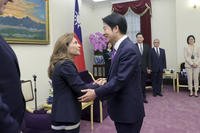A lawmaker who recently returned from Yemen is concerned that the NSA's policy of, in effect, hanging up when they hear an American is on the phone may be hampering our ability to gather intelligence in what is now one of the hottest terrorist spots on Earth.
But it's not the policy alone that is worrisome. After all, the policy has been around for decades and is derived from Title 50, the legislation that governs what the intelligence community and do, and often, how it can do it. The fact that magnifies the concern is that there are an estimated 56,000 Yemenis who hold American passports or would be identified as U.S. persons. And it gets a bit dicier because it's not just people who hold American passports that make listening more difficult. The intelligence community must change its behavior when someone who is being listened to is identified as a U.S. person.
Here's the law, Title 50 U.S.C. 1806 (A):
Information acquired from an electronic surveillance conducted pursuant to this subchapter concerning any United States person may be used and disclosed by Federal officers and employees without the consent of the United States person only in accordance with the minimization procedures required by this subchapter. No otherwise privileged communication obtained in accordance with, or in violation of, the provisions of this subchapter shall lose its privileged character. No information acquired from an electronic surveillance pursuant to this subchapter may be used or disclosed by Federal officers or employees except for lawful purposes.
Apparently, the 1962 evolution in what used to be South Yemen drove many Yemenis to our shores. But they and their children have maintained relatively close ties with their erstwhile homeland. And those links persist. One of my neighbors is a Yemeni, born to one of the country's more influential families.
But Yemen is one of the hottest spots in the world for the SIGINT crowd as the NSA searches for the next shoe bomber, the next nut hungry for publicity who thinks killing innocent people provides a free pass to heaven. And that has lawmakers worried.
I contacted one of the few senior intelligence officials who will talk about these issues and actually has some experience with the issues. "I think that what the congressman tells you is right. Basically, an intel agency can legally listen to foreign telecommunications, but if it believes one party is a U.S. person then they must drop that." Are there ways around this? "I don't think they can usually find a way around it." he said.
This isn't a problem that pertains only to Yemen; nor is it a weakness of the intelligence community. But it is a combination of law, policy and history that poses great challenges to the IC. And at least one senior lawmaker wants to help find ways to, shall we say, minimize its negative effects.








